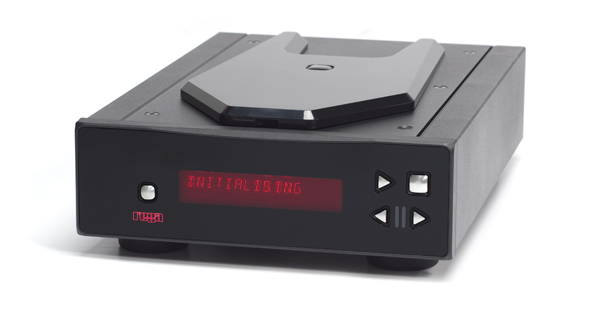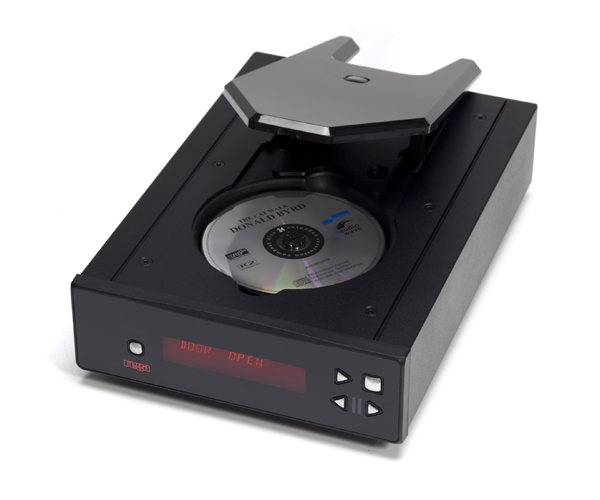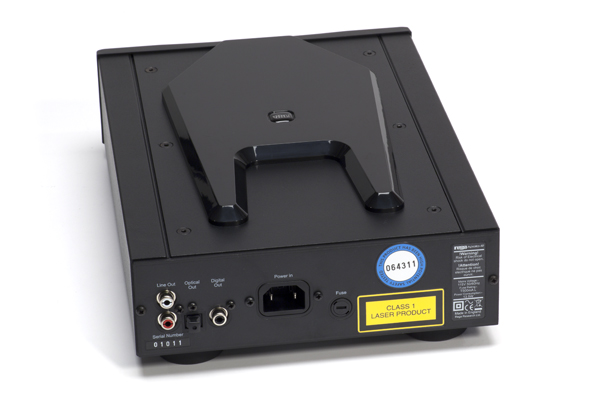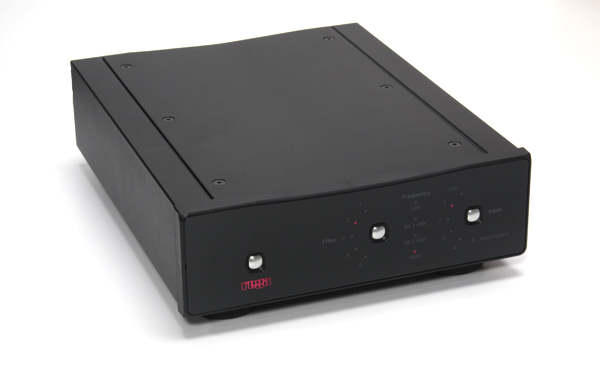Rega Apollo – R CD Player Redefining Possibilities
By Jeff Dorgay Rega’s Apollo-R smokes the dCS Paganini. Okay, it’s not that awesome, but I got your attention, no? In all seriousness, the Apollo-R is a damn fine CD player. Even as computer audio continues to be all the rage, many people still enjoy dropping a CD into a transport and pushing “Play.” Rega is one reason why they do.
Rega’s Apollo-R smokes the dCS Paganini. Okay, it’s not that awesome, but I got your attention, no? In all seriousness, the Apollo-R is a damn fine CD player. Even as computer audio continues to be all the rage, many people still enjoy dropping a CD into a transport and pushing “Play.” Rega is one reason why they do.
The Apollo-R matches the recent Brio-R and DAC in size and form. Rega uses a similar but not exactly the same case for everything—a strategy meant to retain high quality and performance while keeping the price low. However, Rega components sport a smart, stylish, and functional look. Legacy customers will notice the top-loading “spaceship lid” is continuous with that of the previous Apollo. The major difference is that the Apollo-R boasts a “half-size” enclosure akin to the Brio-R integrated amplifier and DAC.
Rega CD players do not take a disproportionate amount of time to acclimate or “break in.” Once unpacked and set up, the Apollo-R sounds smashing, and opens up even more once powered up for 48 hours. While Rega offers an upgraded mains cable with its flagship ISIS player, and extends this approach via the Apollo-R, purchasing an expensive power cord doesn’t jibe with the overall ethos. More improvement is easily had with the Rega DAC.
A Major Improvement
“The Apollo does a fantastic job with the fundamentals. Pace, timing, and tonality—they are all here in great quantity for the price.” That’s what I said about the Apollo in Issue 14. Both generations of Apollo possess a very analog-like quality, but aren’t the last word in transient attack or bone-crushing dynamics. Considering how many CDs are now mastered, such shortcomings aren’t awful.
Still, the Apollo-R adds extension and sock without compromising traits that made the original model so wonderful. That’s progress, especially when you consider the initial unit sells for $100 more. Notably, the advancements have not come at the cost of lost jobs at the UK-based Rega factory. Every product is still handmade by skilled technicians, many of which have labored at Rega for decades.
 In Service of the Music
In Service of the Music
The minute you begin listening, Apollo-R’s signature characteristics spring to the surface. Highly non-digital-sounding, the player excels in peeling back the layers of complex, compressed recordings without instilling harshness. The Afghan Whigs’ Gentlemen is a somewhat-compressed CD that instantly goes south when experienced on a mediocre unit. But the disc reveals a fair amount of texture on a resolving player that straddles the boundaries of resolution and musicality.
On the record’s title track, it’s all too easy for lead singer Greg Dulli’s voice to become buried amidst the growling guitars, doing no service to this 1993 epic. The Apollo-R takes the challenge in stride, keeping Dulli’s vocal track separated from the other musical information. Black Dub’s self-titled debut suffers the same problem. The disc is crunchy and slightly compressed, enough so that it diminishes the overall experience. The Apollo-R tremendously improves the music delivery, again providing requisite separation while locking in the deep bass grooves.
Where the first-generation Apollo claims inherent smoothness, it’s obvious that some of the benefit comes at the expense of air and extension. The bell in “The Wedding” from David Bowie’s Black Tie White Noise showcases more natural decay via the Apollo-R. On the original model, it goes flat and decays too quickly. The new player sounds much more like the $2,595 Saturn and in some ways, better.
The Apollo-R’s greatest forte? The nimble way it navigates tough musical passages without losing its way. Diana Krall’s Live in Paris sounds great on damn near anything, but properly playing back Metallica or Rachmaninoff takes a great CD player. The Apollo-R passes both tests with ease.
Maintains the Pace
If you frequent either UK audio forums or newsstands, “pace” and “timing” frequently appear. These words apply to a hi-fi component (or a whole system) in terms of how well the latter keeps individual players sorted without sacrificing musical cohesiveness. Have you ever heard a band in which the drummer can’t seem to keep time with the rest of the group? That’s pace. Have you ever heard amateur musicians attempting a symphonic piece, and fail at starting and stopping in unison? That’s timing. And while not quite as magnified through a stereo system, music doesn’t adequately lock in and focus if reproduction mechanisms are found lacking.
The better your system, the more cohesiveness will be present. If you listen to a very inexpensive CD player, focus gets lost. As the source quality improves, so does this aspect of musical reproduction. The Apollo-R shines at keeping the pace in a manner that even curmudgeonly listeners will appreciate.
 Tonality to Spare
Tonality to Spare
So far, so good. But natural tonality separates great components from mediocre ones. Here, again, the Apollo-R proves sublime. On jazz and classical favorites, piano and violin are reproduced in a highly convincing fashion. This is not a CD player for which you’ll make excuses.
A few years ago, many audiophiles would brag about how a $400 turntable could humble the best CD players. Those days are over. Comparing the Apollo-R to the new Rega RP3 with Exact cartridge results in a much closer heat than I expected. While the vinyl possesses a skosh of midrange warmth absent in the digital player, the latter offers wider dynamic range and impact.
Comparing two excellent pressings of Beck’s Sea Change from Mobile Fidelity verifies these findings. Yet, when one biases the comparison, performing the same experiment with a random copy of Johnny Winter’s Second Winter and Mobile Fidelity’s gold Beck CD, the Apollo-R surpasses its analog counterpart. After hearing a few discs on the Apollo-R, it’s amazing to think about how far digital has come. Such performance would have cost thousands more at the turn of the century.
 To DAC or Not to DAC
To DAC or Not to DAC
Rega’s $999 DAC takes the Apollo-R even further. Is it worth an extra grand? If you have a highly resolving system, you won’t be disappointed. Not to mention the upgrade affords five digital inputs and greater system-expansion capabilities—including the ability to play high-resolution files.
The DAC also brings superior smoothness to the overall sound, and when switching back and forth between the Apollo-R’s analog outputs and those of the DAC, graininess appears in the Apollo-R that you wouldn’t notice if you hadn’t comparatively listened to them. The units’ chipset is similar. Yet the DAC enjoys a beefier analog stage, a larger power supply, and the ability for the user to select digital filter options.
Unlike getting a sports car equipped with finely tuned sport suspension, where you sacrifice some ability driving on normal roads in exchange for increased performance, there’s no downside to adding the DAC. If you have an extra thousand bucks, and your dealer is kind enough to let you take the DAC home for the weekend, you’ll have a tough time bringing it back Monday morning.
A New Plateau
Rega has been on a roll for years, introducing a plethora of products in the top, bottom, and middle of its range—all of which share the common goal of striving to be class leaders. Admittedly “the last major high-end company to produce a CD player,” the firm doesn’t release transports just to add a button here or there. Substantial increases in performance are required. A recipient of our 2012 Exceptional Value Award, the compact Apollo-R CD player achieves those feats and more.
Rega Apollo-R
MSRP: $1,095
www.rega.co.uk (UK)
www.soundorg.com (US Distributor)
Peripherals
Amplification Rega Brio-R, Burmester 011 pre/911 mk. 3 power amp
Speakers Harbeth Compact 7es3, MartinLogan Montis, GamuT S9
Cable Cardas Clear



